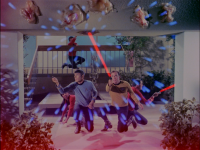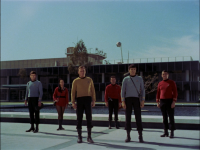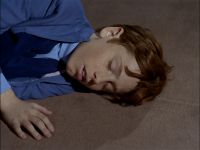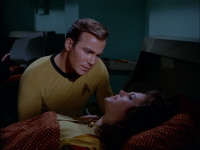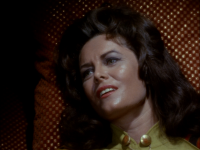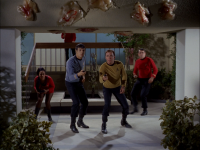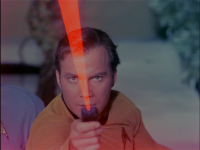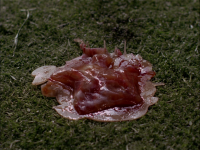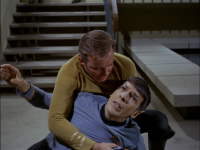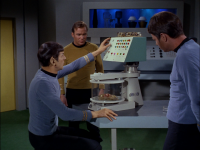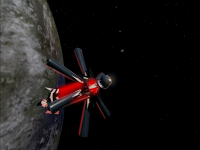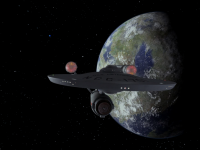Star Trek: The Original Series — 1x29 — Operation: Annihilate!
Synopsis
The Enterprise crew saves Deneva from deadly parasites.
Filler rating: good filler
There's no essential plot or exposition in this episode that renders it unskippable, but it's a decent episode, even though it could have been better.
Remarkable scenes
- The Enterprise flying too close to a star.
- Kirk losing his brother.
- The landing party engaging the parasites.
- Spock getting messed up by a parasite.
- Spock on a rampage.
- Spock resisting the parasite with his Vulcan discipline.
- Kirk revealing that his duty may require him to kill over a million people on the colony in order to prevent the parasites from threatening more colonies.
- Kirk proposing that radiating the parasites with light is the solution to their woes based on the star incident at the beginning.
- Spock volunteering to be blinded.
- Spock's nonchalant reaction to becoming blind.
- The Enterprise deploying the parasite-killing satellites.
- Spock casually explaining why he was able to recover from his blindness much to Kirk's and McCoy's astonishment.
Review
Following up on the quick aside in What Are Little Girls Made Of establishing that Kirk has a brother named Sam, this episode opens quite dramatically with with the death of Sam along with Sam's wife. While the dramatic potential in such a momentous event in Kirk's life could have been better harnessed rather than killing off both characters so unceremoniously, it was nevertheless quite effective in setting rather unusual stakes; especially given the plot's focus on Kirk's struggle to balance saving Sam's orphaned son with saving over a million colonists from the ravioli pancake parasites. The ravioli pancakes themselves weren't the most terribly effective props, but I nevertheless admire the ambition and originality of the attempt. It sure beats another god-like alien.
The next most remarkable feature of the story is Leonard Nimoy's dynamic performance as Spock. Right from the moment the poor guy is invaded by the ravioli pancakes, he instantly becomes the most interesting character on the screen. Rather than subjecting us to the already tired trope of watching a character violently struggle against affliction of the week, Spock rapidly gains control over both his emotions and his actions while still exhibiting subtle visible signs of the intense pain he is experiencing. This allowed for an excellent opportunity to contrast Kirk's and McCoy's reactions to Spock's behavior under this kind of pressure, which added fantastic texture to the story.
Likewise, aside from the goggle logical mishap noted in the problems section of this review, the plot point pertaining to blinding Spock in the interest of scientific research was also nicely done. You feel bad for Spock even though and perhaps especially because he takes it so well. Then to make matters even worse, McCoy discovers after the fact that visible light wasn't even necessary to kill the parasite! So Spock is blinded needlessly. Finally, at the last moment, Spock reveals the details surrounding his inner eyelid to the astonished Kirk and McCoy; he was only temporarily blinded. This plot point borders on a lie to the audience as it's easy to wonder why Kirk and especially McCoy would be so ignorant about this anatomical feature of Spock, but it's just so damn charming that it's easy to forgive their ignorance.
The episode isn't all sunshine and rainbows though, as several aesthetic choices diminish the enjoyability of the story. In addition to the aforementioned goggle problem, the underutilized dramatic potential of the deaths in Kirk's family, and the almost-but-not-quite lie to the audience about Spock's blindness, we also see the recurrence of the just plain annoying cliche where a clearly unstable person confined to sickbay (Spock in this case) is simply allowed to walk out with little to no resistance.
Another bad aesthetic choice centers around Kirk and Spock speculating as to the origins of the ravioli pancakes. Kirk presumes that because their anatomy is so unusual they must be from another galaxy, a deduction that doesn't follow at all. Spock then builds upon this faulty logic by suggesting that they must come from a place where "our" physical laws don't apply. These throw away lines don't really affect the plot, but they are annoying examples of plainly pseudoscientific reasoning unbecoming of a science fiction show. Finally, while the deployment of the UV ray emitting satellites was a cool detail, it seems like yet another overwrought capability for the Enterprise to possess. Imagine the destructive potential for misuse of that power!
Overall though this episode is easily above average, as it successfully integrates a reasonably dense sci-fi plot with well executed elements of adventure, danger, drama, high stakes, and humor. A good send off for the first season.
